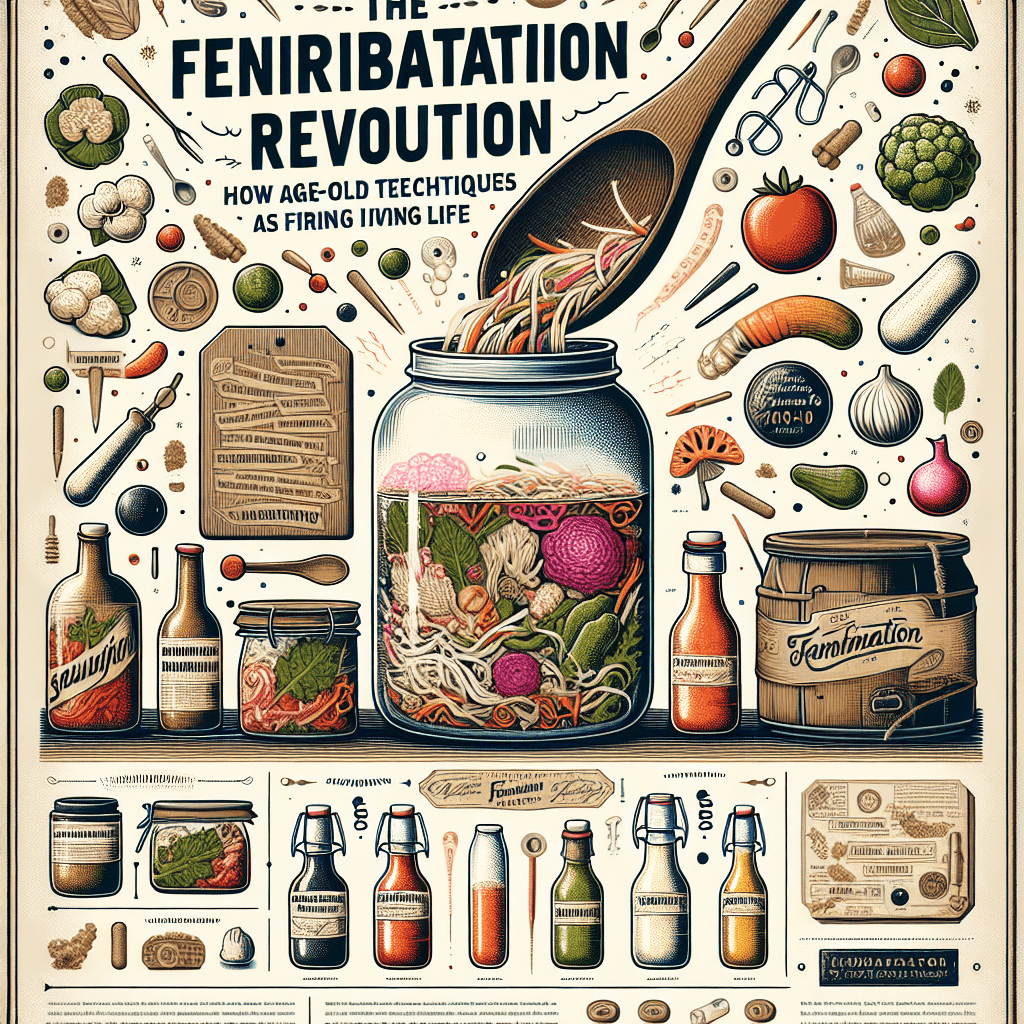[ad_1]
**The Fermentation Revolution: How Age-Old Techniques are Finding New Life**
In the realm of culinary arts and nourishment, everything old becomes new again, manifesting a cyclical pattern of rediscovery that enriches our culture and diets. Nowhere is this more palpable than in the current fermentation revolution, a resurgence of ancient food preparation techniques that are finding new life in modern kitchens and altering our relationship with food, health, and sustainability.
**The Roots of Fermentation**
Fermentation, the conversion of carbohydrates into alcohol or organic acids using microorganisms—yeasts or bacteria—under anaerobic conditions, is a method that predates recorded history. This process, initially a means of food preservation before the advent of refrigeration, also enhances the nutritional value of food, producing essential vitamins and probiotics.
Civilizations across the globe have long revered fermented foods for their enhanced flavors and health benefits. From the tangy kefir and sauerkraut of Eastern Europe to the savory miso and pickled vegetables of Asia, these traditions reflect a time-tested wisdom about the human diet’s relationship with the microscopic world.
**The Modern Fermentation Movement**
Today’s fermentation revolution is characterized by a revival of these age-old techniques, driven by a growing awareness of the microbiome’s critical role in human health and the desire for more natural, sustainable food options. This movement extends beyond mere nostalgia, embodying a profound engagement with the ecological, nutritional, and cultural dimensions of food.
Celebrity chefs and food enthusiasts worldwide are experimenting with fermentation, introducing innovative products that range from artisanal sourdough breads to exotic kimchis. Similarly, home cooks are rediscovering the joy and simplicity of fermenting their own foods, aided by a plethora of resources, from books to online communities.
**Fermentation and Health: The Gut Microbiome Connection**
Much of the fermentation revolution’s momentum comes from our deepening understanding of the human gut microbiome—the vast community of microorganisms living in our digestive tracts. Research suggests that a diverse and balanced microbiome is crucial for digestion, immune function, and even mental health.
Fermented foods, rich in probiotics, act as superfoods for the microbiome, nurturing its diversity and functionality. Regular consumption of these foods can help combat modern maladies such as inflammatory bowel disease, obesity, and depression, heralding a new era of food as medicine.
**Sustainability and the Fermentation Ethos**
Beyond health benefits, the fermentation revolution reflects a broader shift toward sustainable living. Fermentation transforms waste—a significant issue in our global food system—into viable, nutritious products. It champions local and seasonal eating, as fermented dishes often rely on regional ingredients and traditional knowledge.
Moreover, this movement encourages a more intimate connection with our food. Fermenting at home fosters mindfulness about what we eat and how it impacts our bodies and the environment. It’s a quiet protest against the industrial food complex and a return to a more personal and sustainable way of living.
**Challenges and Opportunities**
Despite its benefits, the fermentation revolution faces challenges. Skepticism about the safety and palatability of fermented foods persists, as does the need for more research on the health effects of specific fermented foods. Regulatory hurdles can also stifle small-scale producers, impeding the growth of a fermentation-based food economy.
However, these challenges also present opportunities for education, innovation, and community building. As more people come to appreciate the flavors, health benefits, and ecological advantages of fermented foods, the movement will continue to grow, fostering a healthier and more sustainable relationship with our food.
**FAQs About the Fermentation Revolution**
**Q: Is fermenting food at home safe?**
A: Yes, fermenting food at home is generally safe if you follow proper guidelines regarding cleanliness and salt or sugar concentrations, which inhibit harmful bacteria. It’s essential to educate yourself before starting.
**Q: What are probiotics, and why are they important?**
A: Probiotics are live microorganisms, found in fermented foods, that provide health benefits when consumed by improving the balance and diversity of the gut microbiome. They can enhance digestive health, boost immunity, and potentially affect mood and mental health.
**Q: Can I ferment any type of food?**
A: While many foods can be fermented, they don’t all undergo fermentation the same way. Vegetables, fruits, milk, grains, and legumes are among the common substrates for fermentation. Each requires specific conditions, including the right types of cultures, salt or sugar concentrations, and temperatures.
**Q: How does fermentation impact the nutritional content of food?**
A: Fermentation can increase the levels of certain nutrients, such as B vitamins, and enhance food digestibility and the bioavailability of nutrients. This process can also reduce levels of harmful compounds found in some raw foods.
**Q: What’s the difference between fermentation and pickling?**
A: Fermentation involves the transformation of food by beneficial microorganisms, which can produce acids or alcohol. Pickling, while similar, often involves preserving food in an acidic solution (like vinegar) without the active role of live microorganisms.
As we continue to rediscover and reinvent the time-honored tradition of fermentation, we’re not just revisiting the past; we’re redefining our future around healthier, more sustainable diets. The fermentation revolution is an invitation—a call to engage more intimately with our food, our health, and our planet.
[ad_2]

Leave a Reply